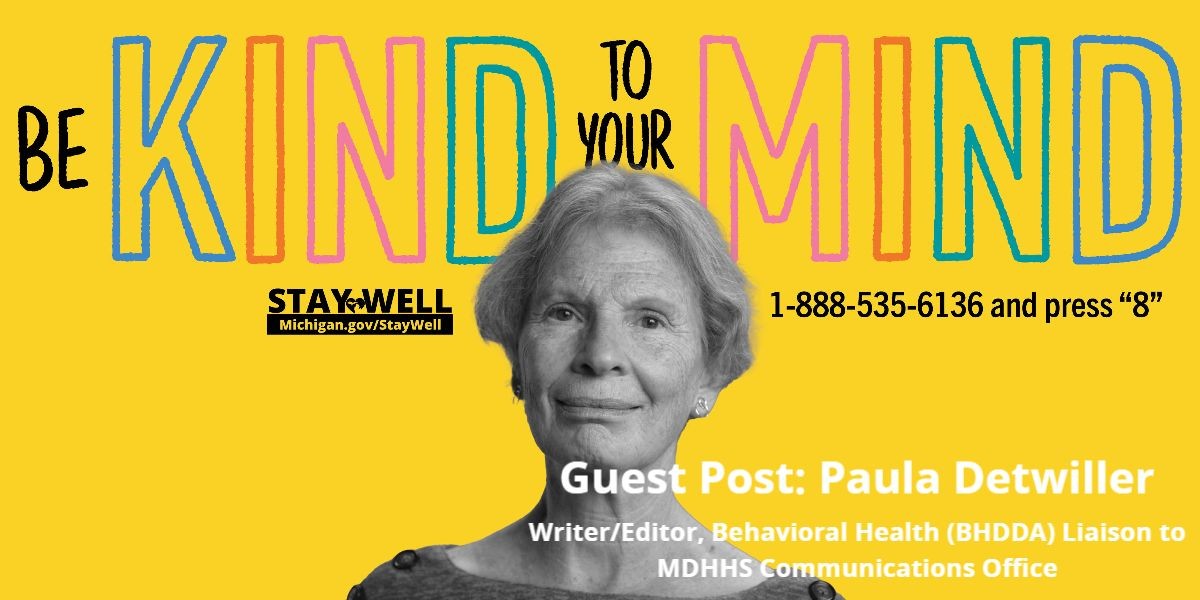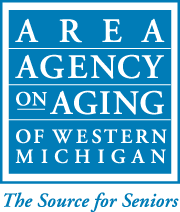Caregiver's Corner: Be Kind to Your Mind

By Paula Detwiller, Writer/Editor, Behavioral Health (BHDDA) Liaison to MDHHS Communications Office
Do you find yourself feeling anxious, sad, or hopeless because of the COVID-19 pandemic?
If so, you are not alone. In a poll taken at the end of June, nearly half of U.S. adults reported their mental health had been negatively impacted. Emotional distress can be especially acute in older adults who live alone or are socially isolated. Older adults in a variety of settings may be less able to visit with loved ones, and loneliness and social isolation can contribute to depression. Add in the fact that more people over 60 die from coronavirus than any other age group, and it is understandable that older adults may be struggling to keep fear, worry, and grief at bay.
In fact, behavioral health experts say our emotional reactions to the COVID-19 pandemic parallel the feelings we experience when our lives are upended by other types of disasters, such as wildfires, earthquakes, and floods. These reactions include:
- Having problems falling or staying asleep
- Experiencing more conflicts or tension with family members or other people
- Crying easily or becoming tearful for no apparent reason
- Having trouble concentrating or remembering things
- Experiencing an increase or decrease in your normal appetite
- Loss of interest in everyday activities
- Having a sense of despair, hopelessness, or emptiness about the future
- Drinking more alcoholic beverages
If you recognize any of these reactions in yourself, talking to someone about it may help to improve your outlook and well-being. That’s why a team of behavioral health professionals at the Michigan Department of Health and Human Services (MDHHS), with the help of federal grant dollars, created the “Stay Well” counseling line—a phone number you can call any time of the day or night to talk to a trained crisis counselor about your COVID-19-related distress.
To reach the Stay Well counseling line, dial 888-535-6136, and listen for the prompt to press “8.” Counseling is free and confidential. It is available seven days a week, 24 hours a day.
“Stay Well counselors help people understand their feelings and reactions during a disaster like the COVID-19 pandemic,” said psychiatrist Dr. Debra Pinals, MDHHS’ medical director for behavioral health. “They are taught to listen, not judge, and help callers develop coping strategies, review their options and connect with agencies that may help them. All of this can reduce callers’ stress and improve their ability to endure the realities they face.”
The Stay Well counseling line is being promoted statewide with a media campaign called “Be Kind to Your Mind.” That message is meant as a gentle reminder that there should be no shame or stigma associated with getting emotional support if the ongoing pandemic is getting you down.
For brochures, videos, and links to other resources for coping with COVID-19-related stress, visit www.Michigan.gov/StayWell. In addition, Stay Well will also be offering support groups for older adults. Taking place the 2nd and 4th Wednesday of each month, beginning at 10 am. Registration is available on their webpage here or the person can call the Stay Well line to register.
Want to learn more about recognizing COVID-related emotional distress in older adults and how the Stay Well program can help? Please attend the next Family Caregiver University class via zoom. The class will be held on Tuesday, January 26: 1-2:30 p.m. For more information on Family Caregiver University classes provided by the Caregiver Resource Network, please call (888) 456-5664 or visit www.caregiverresource.net
Caregiver’s Corner is provided as a public service of the Caregiver Resource Network. The Caregiver Resource Network is a collaboration of West Michigan organizations dedicated to providing for the needs and welfare of family and professional caregivers within the community. Funded by the Area Agency on Aging of Western Michigan with Older American’s Act Title IIIE, Family Caregiver Support funds.
Tagged:

